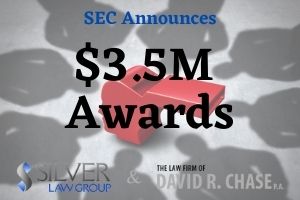 The SEC has announced the award of $3.5 million to whistleblowers in two unrelated successful enforcement proceedings.
The SEC has announced the award of $3.5 million to whistleblowers in two unrelated successful enforcement proceedings.
In the first case, one individual was awarded a bounty of $2M after alerting the SEC to an ongoing fraud that led to the agency opening their investigation. The individual offered continuing assistance, which included documents, interviews, and other information that helped SEC staff conserve time and resources.
The second order saw one individual receive a $1M bounty, and a second one receive $500,000. The first whistleblower provided information that the SEC used as their framework for the investigation. They also provided additional assistance throughout the investigation. The second whistleblower offered “independent analysis” that helped refine the investigation’s focus and assisted with the creation of a subpoena. The second whistleblower’s knowledge also helped the SEC staff members with the final charges that were eventually brought by the commission.
The Use Of Non-GAAP Methodology
Although not a factor in these two cases, many companies use Non-GAAP, or Non-Generally Accepted Accounting Practices. Some use Non-GAAP to supplement their reporting to give a clearer picture to investors. However, the SEC has also discovered that many companies use Non-GAAP in the process of committing fraud.
Non-GAAP can include metrics such as:
- EBITDA (earnings before interest, taxes, depreciation and amortization)
- Adjusted Net Income
- Funds From Operations
- Core Earnings
- Free Cash Flow
These are just some of the many nonstandard metrics a company may include in their reporting. But because Non-GAAP don’t have a uniform definition, independent auditors won’t take them into account.
The use of Non-GAAP can easily turn into fraud and abuse. These metrics are then used to make a company’s financial reporting look better than they are, and ultimately misinforming investors. Those who are familiar with these practices and see the fraud may become whistleblowers. In response, the SEC has increased its scrutiny of public companies who use Non-GAAP in a misleading fashion, including a dedicated internal team to better protect investors. You can read more about this subject in this article from the New York University School of Law.
Retaining Experienced SEC Whistleblower Attorneys
Whistleblowers help everyone by notifying authorities of conduct that harms the public, while also earning financial compensation for themselves. Hiring experienced SEC counsel will greatly increase your chances of the SEC initiating an investigation based on your information. If you wish to remain anonymous, you must be represented by an attorney, who will submit everything on your behalf.
Silver Law and the Law Firm of David R. Chase jointly have experienced SEC whistleblower lawyers, including a former SEC Enforcement attorney on the team, so you will always have guidance throughout the process. Our SEC whistleblower attorneys can help you if you have information regarding securities or investment fraud, violations of federal securities laws, false filings, market manipulation, or other misconduct. You must provide timely, credible, and original information or analysis in order to be eligible.
Contact us through our online form or at (800) 975-4345 for a consultation. Our attorneys work on a contingency fee basis. This means that it costs you nothing to hire us, and we collect our fees when you receive an SEC bounty. Because we get paid when you do, we have the incentive to help you collect the maximum award available.
 SEC Whistleblower Lawyer Blog
SEC Whistleblower Lawyer Blog

